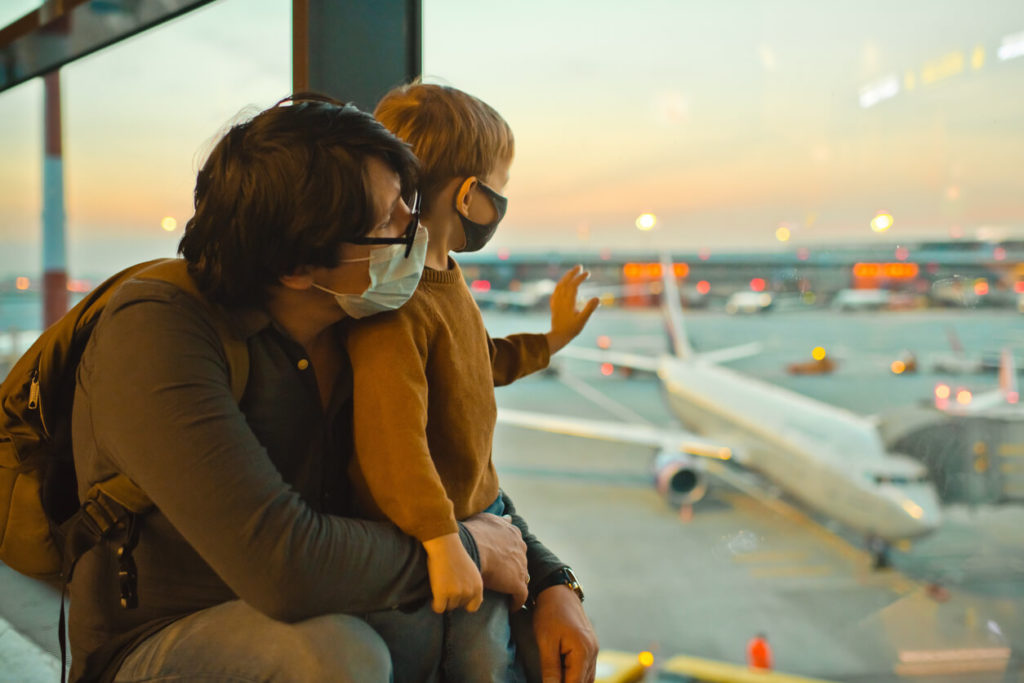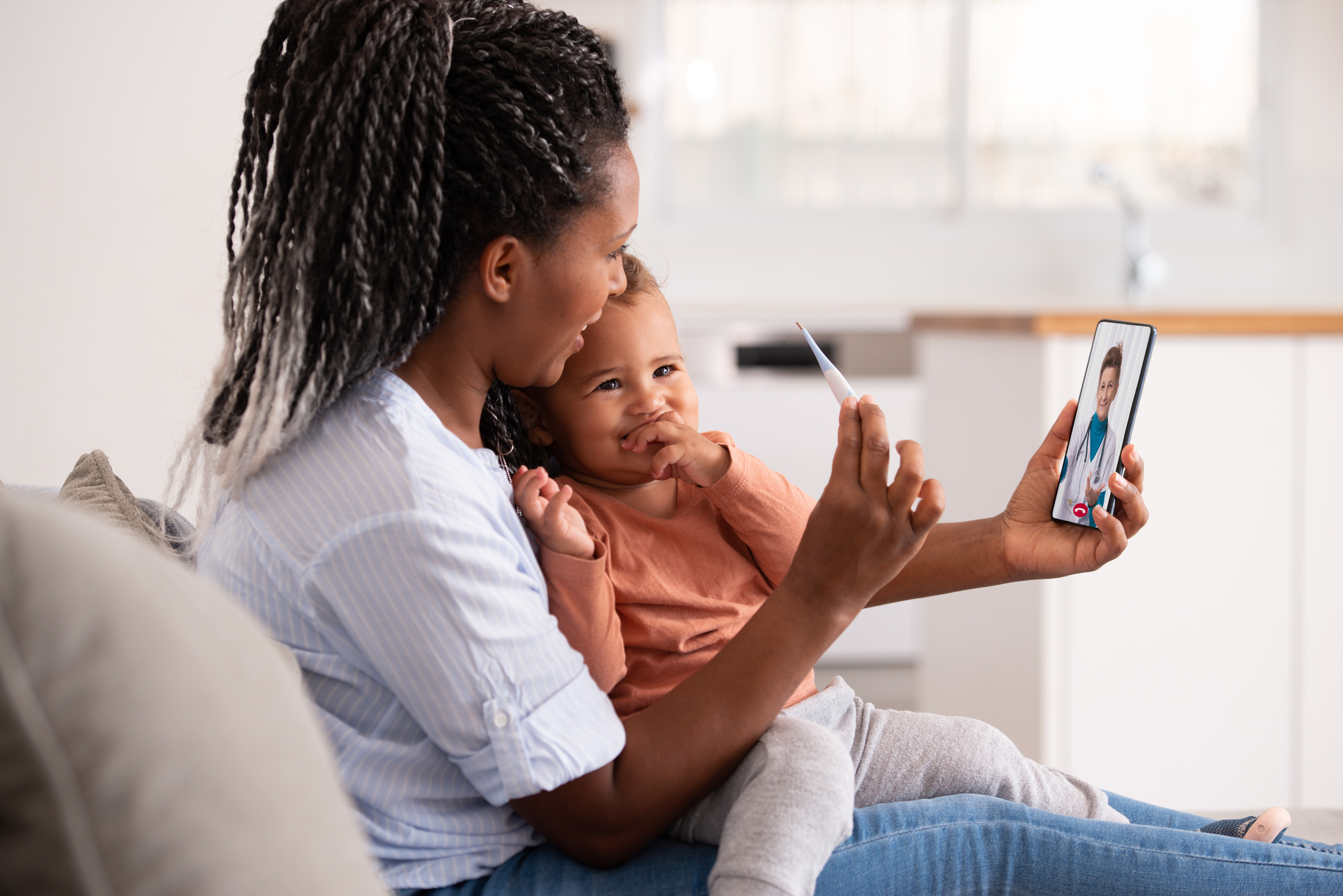Travel during the holidays can be stressful. Long security lines, delayed flights, and inclement weather are common challenges most holiday travelers grapple with every year.
And in an ongoing global pandemic, there’s another thing you need to remain wary of while traveling this holiday season: staying diligent to reduce your chance of catching a cold, the flu, or COVID-19.
How Risky is Holiday Travel?
Travel increases your risk of getting sick this holiday season for several reasons:
- Spending time in indoor spaces that lack ventilation
- Extended close contact with others (closer than 6 feet for more than 15 minutes)
- The potential of inconsistent mask use
The risk of catching a cold or virus also increases in large groups of people. That’s because germs from the common cold, flu, and COVID-19 can travel via respiratory droplets.
Whenever you sneeze or cough, you expel a small amount of mucous in minuscule, hard-to-see droplets from the nose or the mouth. If a person is sick, infectious pathogens can travel in these droplets and expose nearby people. This is important since coronavirus reproduces in your nose.
The real risk of exposure to cold or flu during the holiday travel season is in the hustle and bustle before and after getting on an airplane.
In crowded places — like airport bathrooms, long security lines, or busy and crowded terminals — there’s a risk of interacting with someone who is sick. Thankfully, the risk of exposure to pathogens on airplanes is low. This is due to powerful filtration systems and the way air flows on modern aircraft.
Who is Most at Risk of Getting Sick This Holiday Season?
Everyone is susceptible to the risk of germs and viruses while traveling this holiday season. But the elderly and immune-compromised people are even more at risk.
Current research shows that in adults who have COVID-19, there’s no difference in the amount of the virus between people with and without symptoms, or between vaccinated and unvaccinated people.
Studies are also showing that kids can be infectious vectors for the virus as well, even if they don’t experience symptoms.
That means everyone is contagious if they catch coronavirus, making the virus easy to spread. This is similar to the flu and cold, but some people simply show more symptoms.
Because COVID-19 is so contagious, it puts the most vulnerable populations in our communities at risk of catching it. The people most at risk during holiday travel are:
Elderly
- According to the CDC, 70-85% of all flu related deaths are from people over the age of 65.
- Similar statistics of severe sickness, hospitalization, and death from COVD-19 have been shown in studies to adversely affect older populations.
- Because your immune system’s defenses weaken as you get older, the chances of getting sick for this age group are much higher.
- If you or someone you love is 65+ and considering traveling this winter, it’s important to weigh the risks of exposure.
Unvaccinated
- The consensus is in: vaccines work to prevent you from getting COVID-19.
- Young or old, the chances of getting severely sick or dying from coronavirus is dramatically higher without a vaccine and a booster.
- Holiday travelers moving through busy places like airports and bus or train stations without the shield of immune protection from a vaccine are at a much higher risk of sickness across the board — including the cold and flu.
Immune Compromised
- In cases of COVD-19, immunocompromised people tend to get sicker for longer, and with more complications and a higher risk of death.
- Chronic illness, genetic disorders, or a recent surgery might also cause a weakened immune system.
- Regardless of age, folks with previous conditions are especially vulnerable during flu and virus season.
Underweight or Overweight
- Both the flu and coronavirus have been shown to adversely affect people who have a very low or very high BMI.
- Studies have found that the flu can be contagious for longer and increase the risk of hospitalization in people who are chronically overweight.
- There is also increased severity and mortality of COVID-19 in obese people.
How to Travel Safely This Holiday Season
No one wants to spend the holidays feeling under the weather. Plus, you don’t want to spread your sickness to your loved ones — especially if they’re at high risk for serious health complications from things like the flu or COVID-19.
Read on to understand traveling this holiday season, plus the best travel safety tips to stay healthy, safe, and mindful this holiday season.
1. Check Local Travel Requirements and Restrictions
Your risk factors of getting sick this holiday season depend on where you’re going and what you’ll be doing. Holiday parties, family gatherings, and events where you’ll interact with people who aren’t part of your daily life increase the chances of exposure to new germs, bacteria, and viruses.
Due to the Delta and Omicron variants, COVD-19 is still surging in many places. Many countries around the world have required vaccinations for travel. Be prepared to show proof of vaccination and/or a recent negative COVID test to be able to enter new countries while traveling on an airplane.
Check out this international heat map from the CDC for travel restrictions by country. If you’re staying in the U.S., consider this resource from NPR to look at community spread at the city and county level and travel restrictions by state.
Local rules will affect how and where you eat, shop, and move around public spaces while traveling abroad. Be sure to follow social distancing rules and mask mandates upon arrival.
If you’re leaving the U.S., you must be able to show a recent negative COVID test or documentation of recovery before you fly back. That’s regardless of citizenship or vaccination status. Check with the CDC for ongoing updates.
2. Follow A Healthy Lifestyle
- Healthy lifestyle choices like eating a diet high in vegetables, fruits, whole grains, and healthy proteins can give your body an advantage to fight off infections and viruses this holiday season.
- Regular exercise has been shown to strengthen your immune system response and lower your risk of things like heart disease, lung disease, and blood pressure.
- A plant-based diet has even been linked to a lower chance of infection by COVID-19!
3. Wear a Mask
- Hundreds of studies around the world have found the same thing: masks reduce the transmission of coronavirus.
- Surgical masks like the KN95 model are the most effective because they reduce transmission from an infected person by up to 90%.
- But any face covering will help: studies show that even though the Delta and Omicron variants are more infectious, cloth masks are still an effective way to reduce inhalation of COVID-19 particles by upwards of almost 50%.
4. Keep Your Distance
- Social distancing can be difficult depending on your job, mode of travel, and what you do for fun.
- Where possible, keep some space between you and others for health and safety: There’s a massive decrease in the trajectory of infections and deaths from COVID-19 simply by keeping a 6-foot distance between people in an enclosed space.
5. Get Vaccinated
- No matter which coronavirus vaccine you get, the results are widespread and clear: vaccines work.
- COVID vaccines prevent between 80% or more of the symptoms of severe or fatal COVID. The vaccine helps your body become immune without getting the virus itself. It trains your cells to fight the virus if you encounter it.
- Just like the flu vaccine, the chances are high that the coronavirus vaccine will keep you and the people you love healthy, even if you’re exposed to the virus.
- If it’s been more than 6 months since your shot from Pfizer or Moderna, or more than 2 months for your Johnson and Johnson shot, research shows that your immunity to COVD-19 is probably waning.
- That means you may be eligible for a booster shot to increase immunity to Covid in addition to your first series of shots. You don’t have to get the same shot from the same company that you got for your initial set.
- Find out if it’s your turn for a booster.
6. Travel with Health Insurance
- If you do get sick while traveling, international travel medical insurance can help reduce the cost of your stay.
- Some plans can even reimburse you up to 100% for cancellations due to catching the virus unexpectedly.
- Check out Forbes’ top list of Pandemic Travel Insurance for 2021. Top choices cover medical expenses up to $500,000 — which should be enough to get you home safe and healthy.
7. Choose a Safe Place to Stay
Where you stay this holiday season can help you stay safe from germs. For example, an Airbnb might be safer and cleaner than a busy hotel.
If you’re staying in a hotel, here are a few tips to stay safe:
- Take the stairs and avoid the crowded elevator.
- Open the window and turn on a fan when you first arrive to get the air moving and ventilate the room, in case someone who was unhealthy stayed there.
- Wear a mask when moving through shared spaces.
- Go early to the shared buffet to get the freshest food, and avoid the crowd.
- Check in and check out digitally. Most hotels and booking services have an app.
8. Talk to an Affordable Online Doctor
It’s crucial to pay attention to your symptoms if you’re feeling under the weather to keep yourself and others safe. Make sure to get familiar with the symptoms of a cold, and the differences between the flu and COVID-19.
If you’re worried you may have a cold, flu, or coronavirus symptoms while traveling this holiday season, you can talk to an online doctor with myCallADoc.
Sign up to become a member and speak to a board-certified doctor within minutes via your smartphone, laptop, or tablet. Our general medicine doctors, pediatricians, and other specialists are available for you and your family day or night, no matter where you are. And you can see a doctor as many times as you want at no extra charge.
Our doctors can diagnose and treat over 50 common conditions and illnesses. They can even send your prescription to the nearest pharmacy, no matter where you are.
There’s no insurance required, no co-pays, and no deductibles. Just affordable, convenient, and quality care for you and your family whenever you need it.
Try a myCallADoc membership for only $6.95 for the first 2 weeks >



